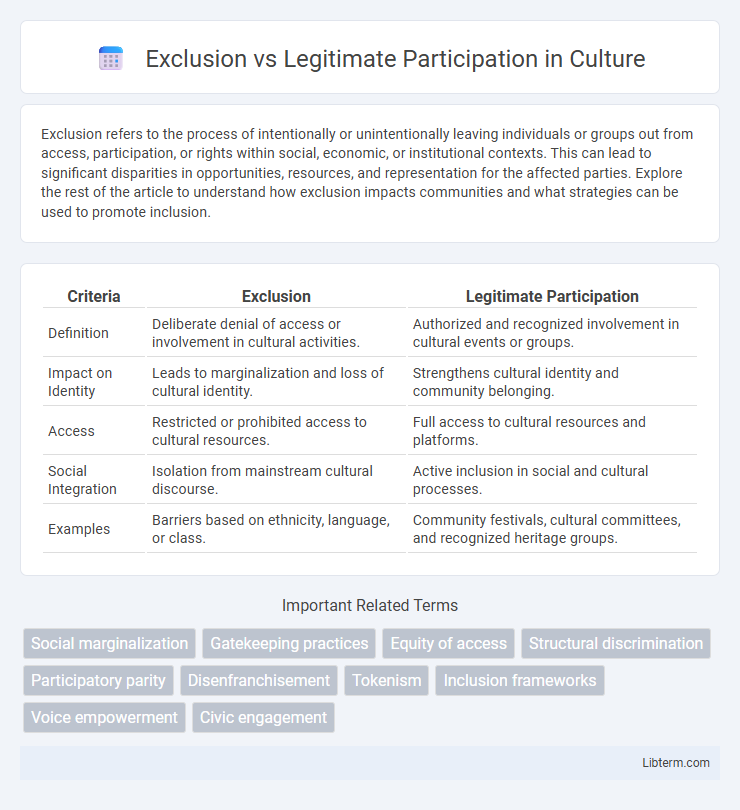Exclusion refers to the process of intentionally or unintentionally leaving individuals or groups out from access, participation, or rights within social, economic, or institutional contexts. This can lead to significant disparities in opportunities, resources, and representation for the affected parties. Explore the rest of the article to understand how exclusion impacts communities and what strategies can be used to promote inclusion.
Table of Comparison
| Criteria | Exclusion | Legitimate Participation |
|---|---|---|
| Definition | Deliberate denial of access or involvement in cultural activities. | Authorized and recognized involvement in cultural events or groups. |
| Impact on Identity | Leads to marginalization and loss of cultural identity. | Strengthens cultural identity and community belonging. |
| Access | Restricted or prohibited access to cultural resources. | Full access to cultural resources and platforms. |
| Social Integration | Isolation from mainstream cultural discourse. | Active inclusion in social and cultural processes. |
| Examples | Barriers based on ethnicity, language, or class. | Community festivals, cultural committees, and recognized heritage groups. |
Understanding Exclusion in Society
Exclusion in society manifests through systematic barriers that prevent marginalized groups from accessing resources, opportunities, and decision-making processes, leading to social inequality and disenfranchisement. Recognizing patterns of social, economic, and political exclusion helps in identifying the root causes of disparities and informs policies aimed at fostering legitimate participation. Inclusive frameworks promote equitable access and representation, enabling all individuals to contribute meaningfully to societal development.
Defining Legitimate Participation
Legitimate participation refers to the rightful inclusion of individuals or groups in decision-making processes, activities, or social systems, based on established criteria such as legal rights, social norms, or organizational rules. It ensures that participants have recognized authority, credibility, or qualifications that validate their involvement, distinguishing them from those who may be excluded due to lack of such legitimacy. Defining legitimate participation requires clear guidelines that balance inclusivity with the preservation of integrity and order within the given context.
Historical Contexts of Exclusion and Inclusion
Historical contexts of exclusion and legitimate participation reveal patterns of systemic marginalization rooted in social, racial, and economic inequalities. Colonialism, segregation laws, and discriminatory voting regulations historically disenfranchised marginalized groups, limiting their political and social inclusion. Efforts toward legitimate participation emerged through civil rights movements, labor unions, and legal reforms that sought to dismantle exclusion and promote equal access to governance and public institutions.
Key Factors Influencing Social Exclusion
Key factors influencing social exclusion include economic disparity, limited access to education, and discrimination based on race, gender, or ethnicity. Social exclusion reduces opportunities for legitimate participation in political, social, and economic activities, leading to marginalized communities with diminished social capital. Structural inequalities in housing, healthcare, and employment further exacerbate exclusion, hindering inclusive societal engagement.
Barriers to Legitimate Participation
Barriers to legitimate participation often stem from systemic exclusion, including discriminatory policies, lack of access to resources, and socio-economic inequalities that prevent marginalized groups from fully engaging in civic or political processes. Structural obstacles such as limited education opportunities, restrictive voting laws, and insufficient representation further exacerbate these challenges, undermining equitable inclusion. Overcoming these barriers requires targeted reforms that promote accessibility, empowerment, and greater inclusivity within decision-making institutions.
Impacts of Exclusion on Individuals and Communities
Exclusion from social, economic, or political participation diminishes individuals' self-esteem, limits access to essential resources, and reduces opportunities for personal and professional growth. Communities experience increased inequality, social fragmentation, and weakened collective resilience, leading to marginalization and persistent cycles of poverty. These impacts hinder overall societal progress and exacerbate disparities in health, education, and economic stability.
Benefits of Fostering Legitimate Participation
Fostering legitimate participation enhances organizational trust by encouraging diverse stakeholder engagement and ensuring inclusive decision-making processes. This approach improves innovation and problem-solving capabilities by integrating varied perspectives, leading to higher employee satisfaction and commitment. Companies that prioritize legitimate participation experience better compliance with policies and stronger community relations, ultimately driving sustainable growth and competitive advantage.
Strategies for Promoting Inclusion
Strategies for promoting inclusion emphasize creating accessible environments, fostering open communication, and implementing equitable policies to ensure legitimate participation for all individuals. Prioritizing cultural competence, training programs, and community engagement helps dismantle barriers linked to exclusion. Data shows organizations that adopt inclusive practices experience increased collaboration, innovation, and overall productivity.
Case Studies: Successes and Failures
Case studies on exclusion versus legitimate participation reveal key factors influencing policy outcomes in governance and social inclusion. Successful cases, such as participatory budgeting in Porto Alegre, Brazil, demonstrate increased community engagement and equitable resource distribution, whereas failures like the Flint water crisis highlight the detrimental effects of exclusion on public trust and health. Analysis of these examples underscores the critical role of transparent decision-making and stakeholder involvement in achieving sustainable development goals.
Future Directions for Inclusive Societies
Future directions for inclusive societies emphasize shifting from exclusionary practices to fostering legitimate participation by ensuring equitable access to education, employment, and decision-making processes for marginalized groups. Implementing policies that promote diversity, equity, and inclusion while leveraging technology for enhanced communication and accessibility are critical. Collaborative efforts between governments, private sectors, and communities can drive systemic change, creating environments where all individuals contribute meaningfully to societal development.
Exclusion Infographic

 libterm.com
libterm.com